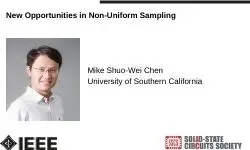-
Members: FreeSSCS
IEEE Members: $8.00
Non-members: $15.00Length: 32:48
23 Oct 2020
ABSTRACT:
Uniform sampling has been widely adopted in today’s circuit designs, ranging from data converters (ADC and DAC), and discrete-time signal processing (such as switched-capacitor filters). It is a well-developed processing technique that leads to many circuit architectures. However, Nyquist theory does not limit us to processing the samples at a uniform time grid so long as the average sample rate is sufficiently high, i.e., no loss of signal information. Why not sample the analog signal in a non-uniform time grid? What is the benefit by doing so? What is the underlying signal processing implication? In this talk, we will provide a background overview and explore new opportunities in non-uniform sampling (NUS) along with several silicon prototypes (from data converter to RF transceiver) that leverage non-uniform sampling. Thanks to the unique properties of NUS, there are interesting possibilities for future circuit- and system-level architectural innovations.
Uniform sampling has been widely adopted in today’s circuit designs, ranging from data converters (ADC and DAC), and discrete-time signal processing (such as switched-capacitor filters). It is a well-developed processing technique that leads to many circuit architectures. However, Nyquist theory does not limit us to processing the samples at a uniform time grid so long as the average sample rate is sufficiently high, i.e., no loss of signal information. Why not sample the analog signal in a non-uniform time grid? What is the benefit by doing so? What is the underlying signal processing implication? In this talk, we will provide a background overview and explore new opportunities in non-uniform sampling (NUS) along with several silicon prototypes (from data converter to RF transceiver) that leverage non-uniform sampling. Thanks to the unique properties of NUS, there are interesting possibilities for future circuit- and system-level architectural innovations.
Primary Committee:
SSCS
